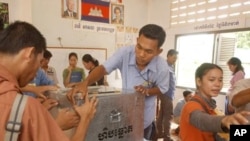WASHINGTON DC- Election observers say politicians should be describing their parties’ platforms to Cambodian voters, not attacking one another personally, in the run-up to next month’s general elections.
Ruling Cambodian People’s Party and opposition officials have begun engaging in public attacks on one another, as the country heads toward the official campaign period in July.
Koul Panha, head of the Committee for Free and Fair Elections, told VOA Khmer that voters expect to hear about policies, not personal affairs and negative attacks, something the politicians are not so far delivering. Issues like poverty, income, corruption and development are getting lost in the fray, he said.
“If the politicians talk and attack each about about personal issues, voters will come to see politics as dirty,” he said. “Each side is dirty, negative, immature, undignified, and immoral.”
Elections past have seen intimidation, violence and even killings, he said. This one is different. The opposition is under severe pressure already, especially through the courts, and by election regulations, he said.
Observers say the prospect of a unified opposition has created more tension around this pre-election season.
Many of the recent negative attacks leading into this year’s election have centered around the Khmer Rouge. Opposition leader Sam Rainsy has sought to link Cambodia’s leaders to their pasts under the Khmer Rouge, while Prime Minister Hun Sen has accused opposition leaders of denying Khmer Rouge atrocities.
Sam Rainsy himself remains in exile, facing imprisonment on charges he says are politically motivated.
Kem Sokha, the vice president of the opposition Cambodia National Rescue Party and the ranking opposition leader in Cambodia, has been fending off accusations that he claimed atrocities at the Khmer Rouge prison of Tuol Sleng were staged by Vietnamese forces after they ousted the regime. Some observers say he could be set up for a lawsuit under a new law criminalizing such claims.
Kem Sokha is also under public scrutiny following the appearance of a woman at a press conference who claimed to be his mistress.
In a televised speech, Hun Sen attacked Kem Sokha over the alleged affair. “Who is dirty now?” Hun Sen said. “You destroyed her virginity and abandoned her.”
Ou Virak, head of the Cambodian Center for Human Rights, told VOA Khmer that such attacks take voter attention away from real issues. Meanwhile, the expulsion of 29 opposition lawmakers from the CPP-dominated National Assembly this month sends another kind of threatening message, he said.
“If the ruling party fears it will lose the election, or will decline in its votes and seats, then there will be possible tension,” he said. “And it will impact democracy.”
Hun Sen has made much use of broadcast media already, Ou Virak noted. That has meant visiting more places and making more speeches than in the past, likely in response to the formation of a joint political opposition, the Rescue Party, he said.
More than 9 million people are registered for the July 28 elections. The polls will pit the ruling party, which currently has 90 of 123 National Assembly seats, against the new opposition. Six other parties will also take part in the election.
Yong Kimeng, of the People’s Center for Development and Peace, told VOA Khmer that each party has created clear, understandable parties, at least compared to parties in past elections. They should use them to campaign with, he said.
“If the government tries to maintain a good political atmosphere, the people will come to vote more,” he said. “Then the parties in the contest will be happy. This is important. If the atmosphere is murky, the people, number one, will not dare to go vote, and number two, the people will lose home from one election to the next.”
More Policies, Less Political Attacks Needed, Election Observers Say
- Sok Khemara
- VOA Khmer







